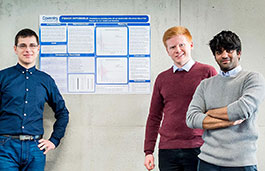Search
Data Science MSci/BSc (Hons)
Study level: Undergraduate
Data scientists/analysts are in demand across a large range of sectors, from healthcare to finance, from marketing to transport. This course aims to provide the essential training you will need to be successful in this fast-moving, dynamic field.
Course features
Course option
Year of entry
Location
Coventry University (Coventry)
Study mode
Full-time
Sandwich
Duration
BSc:3 years full-time4 years sandwich
MSci:4 years full-time5 years sandwich
UCAS codes
256A / 257A
Start date
September 2025
The information on this page is for 2024-25 entry and should be used as guidance for 2025-26 entry. Please keep checking back on this course page to see our latest updates.
Course overview
The course brings together a range of techniques that the modern data scientist needs. You will study modules in mathematics, data analysis and computing and tackle a variety of interesting and engaging problems from the latest research studies, business and industry.
Joint Top Modern University for Career Prospects
Guardian University Guide 2021 and 20225 QS Stars for Teaching and Facilities
QS Stars University RatingsTop 5 UK Student City (Coventry)
QS Best Student Cities Index 2023Why you should study this course
- You will have the chance to equip yourself with transferable and professional skills which prepare you for employment in industry, business, or education.
- You will be provided with the opportunity to develop critical and reflective skills required for problem-solving in a variety of contexts.
- The course has a particular emphasis on modern applications and the use of appropriate computational methods, software and technology.
- You can expect to improve your knowledge and understanding of the theory and practice of the latest data science, as well as the use of computational methods.
- You will have the chance to gain industry-relevant experience2 as you apply real-world, commercial software development practices within teams of your peers, preparing you for your career after graduation.
What you'll study
We regularly review our course content, to make it relevant and current for the benefit of our students. For these reasons, course modules may be updated.
How you'll learn
Learning will be facilitated through a variety of methods which may include lectures, seminars, lab, workshops, online activities and group work.
You will be expected to engage in both class and online activities, and discussions. You can also expect to participate in additional guided reading and self-directed study to reinforce the learning gained from timetabled sessions.
Formative feedback will be used to prepare you for summative assessment and give you an early indication of your progress. A portion of each module’s contact time will be dedicated to course support sessions. The course support sessions2 are where you can explore areas of the course that you may find challenging or get support with your personal projects and employability efforts.
Teaching contact hours
We understand that everyone learns differently, so each of our courses will consist of structured teaching sessions, which can include:
- On campus lectures, seminars and workshops
- Group work
- Self-directed learning
- Work placement opportunities2.
The number of full-time contact hours may vary from semester to semester, however, on average, it is likely to be around 20 contact hours per week in the first and second year dropping to around 12 contact hours per week in the third and final year as you become a more independent learner.
Additionally, you will be expected to undertake significant self-directed study of approximately 20 hours each week, depending on the demands of individual modules.
As an innovative and enterprising institution, the University may seek to utilise emerging technologies within the student experience. For all courses (whether on-campus, blended, or distance learning), the University may deliver certain contact hours and assessments via online technologies and methods.
Since COVID-19, we have delivered our courses in a variety of forms, in line with public authority guidance, decisions, or orders and we will continue to adapt our delivery as appropriate. Whether on campus or online, our key priority is staff and student safety.
Assessment
This course will be assessed using a variety of methods which will vary depending upon the module. Assessment methods include:
- Formal examinations
- Phase tests
- Essays
- Group work
- Presentations
- Reports
- Projects
- Coursework
- Exams
- Individual assignments
The Coventry University Group assessment strategy ensures that our courses are fairly assessed and allows us to monitor student progression towards achieving the intended learning outcomes.
Entry requirements
Typical offer for 2024/25 entry.
Not got the required grades? We offer this degree with an integrated foundation year.
Fees and funding
| Student | Full-time | Part-time |
|---|---|---|
| UK, Ireland*, Channel Islands or Isle of Man | 2025/26 fees TBC 2024/25 fees - £9,250 per year |
Not available |
| EU | 2025/26 fees TBC 2024/25 fees - £9,250 per year with EU Support Bursary** 2025/26 fees TBC 2024/25 fees - £19,850 per year without EU Support Bursary** |
Not available |
| International | 2025/26 fees TBC 2024/25 fees - £19,850 per year |
Not available |
If you choose to study this course with a professional placement2 or study abroad year, you will need to pay a tuition fee3 of £1,250 to cover your academic support throughout your placement year.
For advice and guidance on tuition fees and student loans visit our Undergraduate Finance page and see the university’s Tuition Fee and Refund Terms and Conditions.
The university will charge the tuition fees that are stated in the above table for the first Academic Year of study. The university will review tuition fees each year. For UK (home) students, if Parliament permits an increase in tuition fees, the university may increase fees for each subsequent year of study in line with any such changes. Note that any increase is expected to be in line with inflation.
For international students, we may increase fees each year, but such increases will be no more than 5% above inflation. If you defer your course start date or have to extend your studies beyond the normal duration of the course (e.g. to repeat a year or resit examinations) the university reserves the right to charge you fees at a higher rate and/or in accordance with any legislative changes during the additional period of study.
We offer a range of International scholarships to students all over the world. For more information, visit our International Scholarships page.
Tuition fees cover the cost of your teaching, assessments, facilities and support services. There may be additional costs not covered by this fee such as accommodation and living costs, recommended reading books, stationery, printing and re-assessments should you need them.
The following are additional costs not included in the tuition fees:
- Any optional overseas field trips or visits: £400+ per trip.
- Any costs associated with securing, attending or completing a placement (whether in the UK or abroad).
Find out what's included in your tuition costs.
*Irish student fees
The rights of Irish residents to study in the UK are preserved under the Common Travel Area arrangement. If you are an Irish student and meet the residency criteria, you can study in England, pay the same level of tuition fees as English students and utilise the Tuition Fee Loan.
**EU Support Bursary
Following the UK's exit from the European Union, we are offering financial support to all eligible EU students who wish to study an undergraduate or a postgraduate degree with us full-time. This bursary will be used to offset the cost of your tuition fees to bring them in line with that of UK students. Students studying a degree with a foundation year with us are not eligible for the bursary.
Facilities
On-site facilities4 offer you a variety of learning environments, which benefit from extensive social learning facilities, well-appointed laboratories, lecturing facilities and classrooms, facilitating our innovative teaching methods across a diverse suite of undergraduate and postgraduate courses.
- sigma Centre: mathematics and statistics support
An award-winning support centre which provides a range of learning resources in mathematics and statistics. You can make use of drop-in sessions or one-to-one appointments (subject to availability). - Informal Study Areas:
Informal computer access to all the specialist software required for your studies. There are bookable spaces where you can meet with academics or work in small groups (subject to availability).
Careers and opportunities
The Data Science degree at Coventry University is focused on preparing you to work in one of the most dynamic fields in the digital age, with a focus on transferrable and work-ready skills.
As a data analyst, you will often find yourself working in a multidisciplinary environment, as you bring your technical skills and knowledge to bear upon a specific business issue. This is precisely the type of situation upon which Coventry University built this course, aiming to equip you for the world of work.
Data analysts have job prospects in areas such as business analysis, risk analysis, energy demand forecasting, health analytics, sports analytics, web analytics, games data analytics, social media analytics and more.
Where our graduates work
Previous students have found employment as Financial Analysts at IBM, Gaming Financial Analysts for Warner Bros, Finance Assistants at Scottish Power, Business Performance Process Analysts at National Grid, Power Analysts at E.ON and Customer Service Analysts for Cummins.
Recent graduates have embarked on Finance Graduate Schemes, as Customer Services Analysts, Graduate Actuary, Information Analysts and a Trainee Accountants for companies like E.ON, National Grid, Thames Water, NHS, Hodge Lifetime Solutions and Prime Accountants. Others have also used their qualifications to progress into teaching careers, as well as postgraduate study to obtain MSc, MPhil and PhD qualifications.
Further study
If you meet the criteria, you could choose to take an additional fourth year master's option3, which will deepen your knowledge and expertise.
Graduate Immigration Route visa
Based on current information from the UK Government, international students whose study extends beyond summer 2021 may be eligible for a visa under the UK Government’s Graduate Immigration Route, which will enable students to stay and work, or look for work, in the UK at any skill level for up to two (2) years. Check the most up to date guidance available to check your eligibility and any updates from the UK Government before making an application or enrolment decision.
How to apply
You may also like

Mathematics BSc (Hons)

Physics and Mathematics BSc (Hons)




